Drive
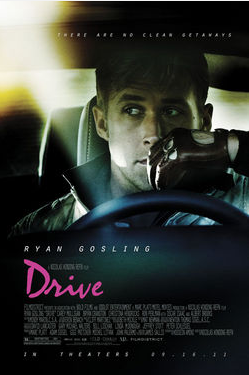
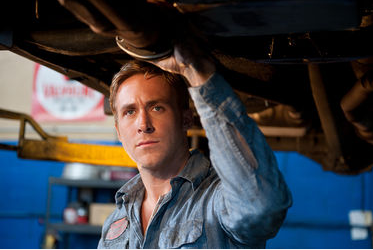 The film's opening sequence sets up what the remainder of the film will be like beautifully. A store is robbed, and two crooks climb into the getaway car. The driver of the vehicle does not make a speedy escape, like we expect. Instead, the sequence plays out as an extended game of cat and mouse, with the driver using a stopwatch, a police scanner, and a live baseball game on the radio to plan out his escape. Instead of tearing through the streets of L.A., the driver is slow and deliberate, hiding when needed, and trying to keep a low profile as the police presence slowly begins to build on the streets. It's a tense and beautiful sequence that, taken alone, could have made for a wonderful short film. After the job is pulled off, the driver walks away. And even though we follow him for the rest of the movie, we learn little about him. This is intentional.
The film's opening sequence sets up what the remainder of the film will be like beautifully. A store is robbed, and two crooks climb into the getaway car. The driver of the vehicle does not make a speedy escape, like we expect. Instead, the sequence plays out as an extended game of cat and mouse, with the driver using a stopwatch, a police scanner, and a live baseball game on the radio to plan out his escape. Instead of tearing through the streets of L.A., the driver is slow and deliberate, hiding when needed, and trying to keep a low profile as the police presence slowly begins to build on the streets. It's a tense and beautiful sequence that, taken alone, could have made for a wonderful short film. After the job is pulled off, the driver walks away. And even though we follow him for the rest of the movie, we learn little about him. This is intentional.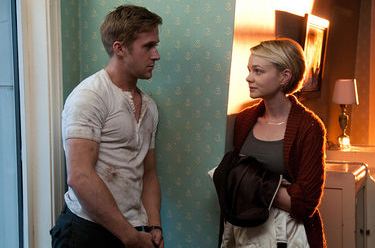 We don't even learn his name during the course of the film. The credits simply list him as "The Driver", and he's played by Ryan Gosling in a performance of steely magnetism. He doesn't say much, nor does he have to. In fact, I would go so far as to say that the screenplay by Hossein Amini should be studied by anyone who wants to learn effective minimalist dialogue, as most of this film's power is through expression and the actions of the characters. We learn that the Driver works as a Hollywood stuntman during the day, and serves as a getaway driver for hire on the side. His life seems to be under control, for the most part. Then he meets the pretty young woman who lives in the apartment down the hall from him. Her name is Irene (Carey Mulligan), a mother trying to raise her young son on her own while her husband is in prison. The husband is due to get out fairly soon, but the Driver can't help it. He falls for the woman, and as he spends time with her, he falls for the kid too.
We don't even learn his name during the course of the film. The credits simply list him as "The Driver", and he's played by Ryan Gosling in a performance of steely magnetism. He doesn't say much, nor does he have to. In fact, I would go so far as to say that the screenplay by Hossein Amini should be studied by anyone who wants to learn effective minimalist dialogue, as most of this film's power is through expression and the actions of the characters. We learn that the Driver works as a Hollywood stuntman during the day, and serves as a getaway driver for hire on the side. His life seems to be under control, for the most part. Then he meets the pretty young woman who lives in the apartment down the hall from him. Her name is Irene (Carey Mulligan), a mother trying to raise her young son on her own while her husband is in prison. The husband is due to get out fairly soon, but the Driver can't help it. He falls for the woman, and as he spends time with her, he falls for the kid too.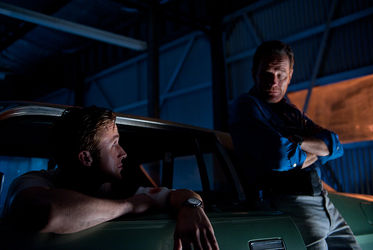 The movie is not in any sort of rush, and allows these characters time to grow and develop. We know that Irene has the same feelings for our hero as he does, but she is faithful to her husband. When the husband, Standard (Oscar Isaac), returns home after serving his time, he is surprisingly not jealous of the relationship that grew while he was away. We can tell that he's a good man who has made a lot of mistakes in the past, and wants to go straight. However, the people around him won't let him go straight, and he owes a lot of protection money to a pair of mobsters. When threats start being made against Irene and her son if Standard does not pull off one last job for the mobsters, the Driver agrees to step in, and act as the getaway driver on the job.
The movie is not in any sort of rush, and allows these characters time to grow and develop. We know that Irene has the same feelings for our hero as he does, but she is faithful to her husband. When the husband, Standard (Oscar Isaac), returns home after serving his time, he is surprisingly not jealous of the relationship that grew while he was away. We can tell that he's a good man who has made a lot of mistakes in the past, and wants to go straight. However, the people around him won't let him go straight, and he owes a lot of protection money to a pair of mobsters. When threats start being made against Irene and her son if Standard does not pull off one last job for the mobsters, the Driver agrees to step in, and act as the getaway driver on the job.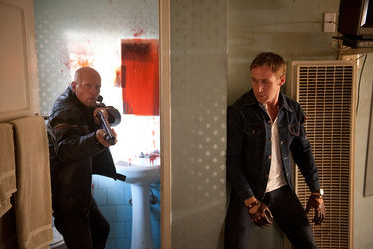 Even though we know there's going to be a double cross, and the Driver is going to wind up in over his head, Drive continues to surprise us with how the film handles the ensuing events. The movie, which has taken a fairly laid back tone up to now, suddenly becomes shockingly brutal and violent. It's all the more brutal, because it is happening to characters that the movie has taken the time to let us get to know before the guns start firing and the heads start exploding. While the plot may sound like your standard Hollywood action film, the film is artful, thanks to the beautiful direction of Refn, who gives the film a very cool and somewhat uncomfortable vibe, which heightens the sense that something bad could happen at any second. It also loves and respects its characters. While the Driver himself may be a mystery to us, we can sense the love he feels for Irene and her son, which carries his actions throughout the film.
Even though we know there's going to be a double cross, and the Driver is going to wind up in over his head, Drive continues to surprise us with how the film handles the ensuing events. The movie, which has taken a fairly laid back tone up to now, suddenly becomes shockingly brutal and violent. It's all the more brutal, because it is happening to characters that the movie has taken the time to let us get to know before the guns start firing and the heads start exploding. While the plot may sound like your standard Hollywood action film, the film is artful, thanks to the beautiful direction of Refn, who gives the film a very cool and somewhat uncomfortable vibe, which heightens the sense that something bad could happen at any second. It also loves and respects its characters. While the Driver himself may be a mystery to us, we can sense the love he feels for Irene and her son, which carries his actions throughout the film.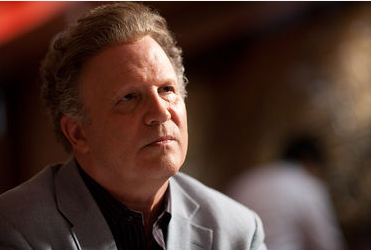 There is some interesting casting here, as well, and all of it works. Gosling, who has mainly worked in conventional romantic and light comedy roles, plays the silent, deadly, yet compassionate type very well. He says little, but his emotions run deep, and we can tell that there is a lot going on in his character and his portrayal. Another great example of playing against type is Albert Brooks, as one of the deadly mobsters behind it all. Usually known for sympathetic and funny roles, Brooks at first does not look the part, but he is able to convince us with his portrayal of a level-headed man, who is no less dangerous than his more outspoken and violent partner in crime, played by Ron Perlman. Both make effective villains, but Brooks stands out more, since it's such a different role for him, and he tackles it so well.
There is some interesting casting here, as well, and all of it works. Gosling, who has mainly worked in conventional romantic and light comedy roles, plays the silent, deadly, yet compassionate type very well. He says little, but his emotions run deep, and we can tell that there is a lot going on in his character and his portrayal. Another great example of playing against type is Albert Brooks, as one of the deadly mobsters behind it all. Usually known for sympathetic and funny roles, Brooks at first does not look the part, but he is able to convince us with his portrayal of a level-headed man, who is no less dangerous than his more outspoken and violent partner in crime, played by Ron Perlman. Both make effective villains, but Brooks stands out more, since it's such a different role for him, and he tackles it so well.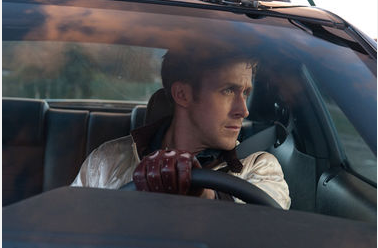

See the movie times in your area or buy the DVD at Amazon.com!






0 Comments:
Post a Comment
<< Home